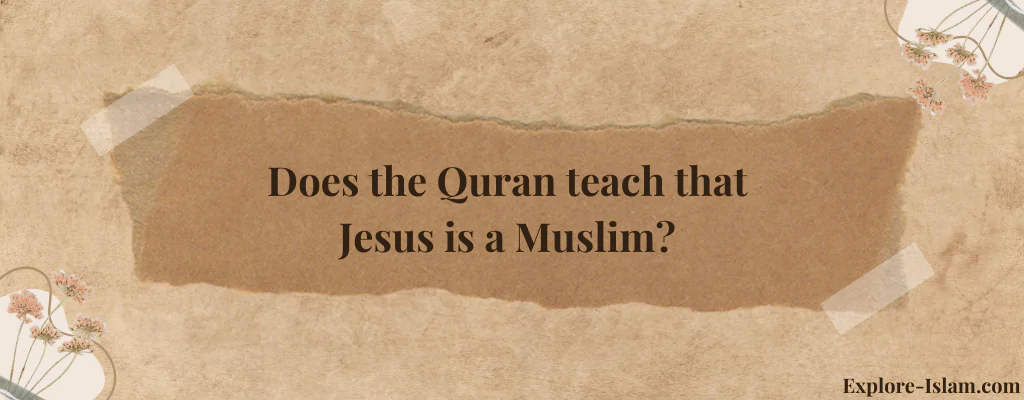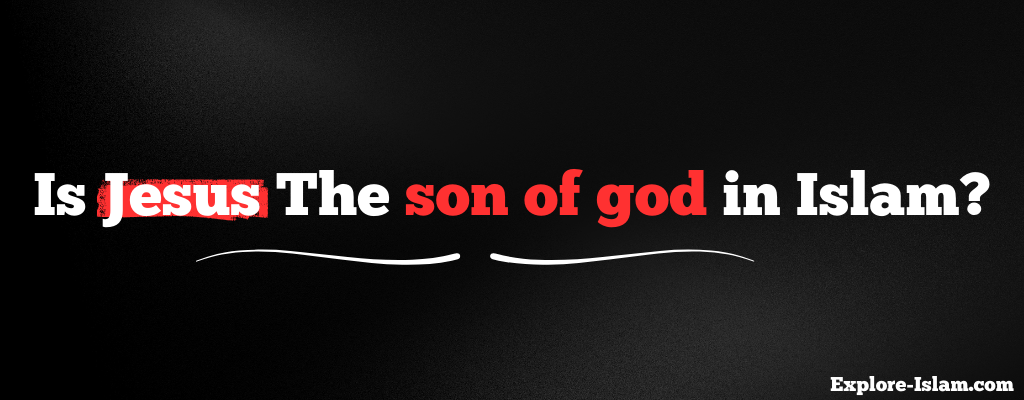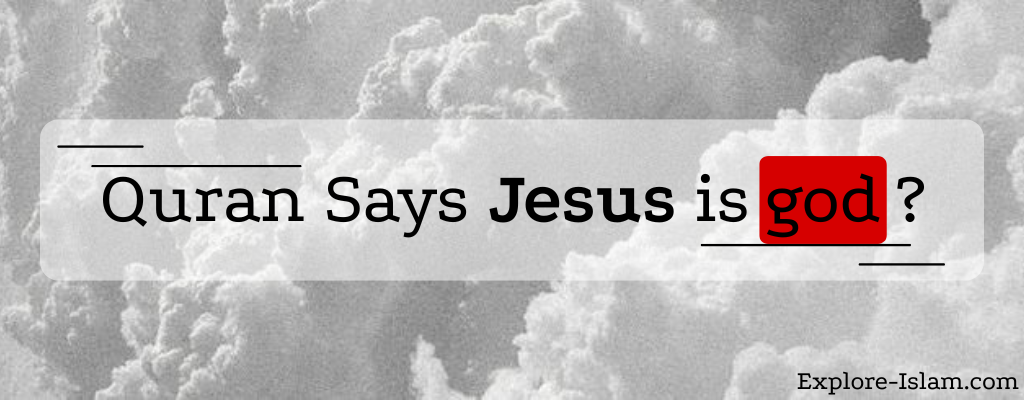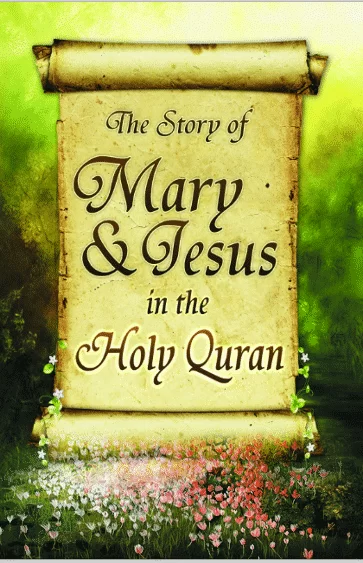Do you know What Does the Quran Say About Jesus? The Quran provides a profound insight into the life and mission of Jesus (PBUH), mentioning him 25 times across various Surahs. In these verses, Jesus is depicted as a revered prophet, performing miracles and conveying God’s message to humanity. Notable chapters like Al-Baqarah, Aal-Imran, An-Nisaa’, and Maryam offer detailed accounts of his birth, life, and teachings, providing a distinct perspective on his role in Islam. This article delves into over 20 key verses from the Quran that explain who Jesus is according to Quranic perspective and the significance of his message.
What Does the Quran Say About Jesus Christ?
The Quran portrays Jesus (Isa) as a revered prophet and messenger, born of Mary, performing miracles by Allah’s permission, and guiding the Children of Israel. It rejects the notion of his divinity, emphasizing that he was a servant of Allah, with no claim to godhood. Provided are examples of Quranic verses (English interpretation of meaning) about Jesus (PBUH):
1. Miraculous Birth of Jesus
Jesus’ miraculous birth is a central theme in the Quran. Born to Mary (Maryam) without a father, his conception was a divine decree. Allah says:
“She said, ‘My Lord, how will I have a child when no man has touched me?’ [The angel] said, ‘Such is Allah; He creates what He wills. When He decrees a matter, He only says to it, “Be,” and it is.’”
2. Endowment with Miracles and Support by the Holy Spirit:
Jesus was granted miracles (such as healing the blind, lepers, and raising the dead) and supported by the Spirit of God (Ruh al-Qudus).
“And [make him] a messenger to the Children of Israel, [who will say], ‘Indeed I have come to you with a sign from your Lord: I design for you from clay [that which is] like the form of a bird, then I breathe into it and it becomes a bird by permission of Allah.’”
3. Teaching the Scriptures and Wisdom:
He was taught the Torah, the Gospel, and wisdom, and sent to the Children of Israel. “Allah will teach him writing and wisdom, the Torah and the Gospel.”
4. Jesus as a Servant of God Disavowed of Being Worshipped:
Jesus is referred to as a servant and messenger of God. He performed miracles by God’s permission and urged people to worship God alone.
Moreover, Jesus disowns the claim that he and his mother should be worshipped alongside God, emphasizing that they only worshipped God.
The Quran narrates how Jesus’ disciples believed in him and supported his mission, affirming their submission to Allah:
“But when Jesus felt [persistence in] disbelief from them, he said, ‘Who are my supporters for [the cause of] Allah?’ The disciples said, ‘We are supporters for Allah. We have believed in Allah and testify that we are Muslims [submitting to Him].’”
5. Rejection of the Claim that Jesus is the Son of God:
The Quran rejects the claim that Jesus is the son of God, describing it as a false statement.
“The Jews say, ‘Uzair is the son of Allah’; and the Christians say, ‘The Messiah is the son of Allah.’ That is their statement from their mouths…”
Instead, Jesus declares his servitude to God:
“Indeed, I am the servant of Allah. He has given me the Scripture and made me a prophet.”
6. Disbelief in Jesus’ Divinity, Trinity & Crucifixion:
The Quran denies the divinity of Jesus and the concept of the Trinity, considering such beliefs as acts of disbelief.
“They have certainly disbelieved who say, ‘Allah is the Messiah, the son of Mary.’… Indeed, he who associates others with Allah – Allah has forbidden him Paradise, and his refuge is the Fire.”
The Quran also declares:
“The Messiah, son of Mary, was not but a messenger; [other] messengers have passed on before him…”
The Quran clarifies that Jesus was not crucified; rather, it appeared so to the people, and God raised him up to Himself.
7. Jesus’ Return by the End of the World:
The Quran alludes to the return of Jesus as part of the end times, but does not provide specific details. (Surah An-Nisa: 159). Still, the prophetic traditions adds some details about Jesus return: The Prophet Muhammad (peace be upon him) said:
“The Hour will not be established until the son of Mary (i.e. Jesus) descends amongst you as a just ruler, he will break the cross, kill the pigs…”
8. Acknowledgement of His Mother Mary’s Purity:
Mary, the mother of Jesus, is regarded with high esteem in the Quran, as a pious and virtuous woman chosen by God.
““O Mary! Surely Allah has selected you, purified you, and chosen you over all women of the world.”
9. Jesus Foretells the Coming of Prophet Muhammad
The Quran records Jesus’ prophecy about the arrival of a messenger after him, named Ahmad (another name for Prophet Muhammad, peace be upon him):
“And [mention] when Jesus, the son of Mary, said, ‘O Children of Israel, indeed I am the messenger of Allah to you confirming what came before me of the Torah and bringing good tidings of a messenger to come after me, whose name is Ahmad.’”
10. Condemnation of Disbelievers
The Quran mentions that disbelievers among the Children of Israel were cursed for their transgressions, with Jesus himself affirming Allah’s judgment:
“Cursed were those who disbelieved among the Children of Israel by the tongue of David and of Jesus, the son of Mary. That was because they disobeyed and habitually transgressed.”
11. The Islamic Obligation to Believe in Jesus
Muslims are required to believe in all Prophets and the revelations sent to them, including Jesus. The Quran emphasizes this unity of faith:
“Say, ‘We have believed in Allah and what has been revealed to us and what has been revealed to Abraham and Ishmael and Isaac and Jacob and the Descendants and what was given to Moses and Jesus and what was given to the prophets from their Lord. We make no distinction between any of them, and we are Muslims [in submission] to Him.’”
These points encapsulate the Quran’s view on Jesus, emphasizing his prophethood, miraculous deeds, and the rejection of the claims of his divinity.
What Does Muhammad Say About Jesus In The Quran?
Prophet Muhammad (PBUH) does not directly speak about Jesus (PBUH) in his own words in the Quran. Instead, he conveys the divine revelations from Allah (God) with complete truthfulness. These revelations about Jesus, along with the stories of other prophets, are presented as guidance for humanity.
The Quran describes Jesus (PBUH) with respect and highlights his miraculous birth, prophethood, and the message he delivered. Prophet Muhammad (PBUH) simply relays the messages revealed to him by Allah, and the Quran is the final and preserved scripture, which confirms the fundamental truths found in earlier divine scriptures while correcting any distortions.
Thus, the Quran emphasizes the divinity of its message, as it is the last and unaltered revelation from Allah to humankind.
Read more on Quran authorship here: Who Is The Author Of The Quran?
How Many Times Is Jesus Mentioned In The Quran?
The name Jesus is mentioned 25 times in the Qur’an, while the title Son of Mary is mentioned 23 times, and the description “Messiah” is mentioned 11 times reflecting the significance of this noble prophet in the Qur’an and emphasizing his special status in Islam. Sometimes they are separated and other times combined in one place:
1. The Messiah:
The title “Messiah” (Masîḥ- المسيح) Messiah means the “anointed one.” It is used in the Quran exclusively as a title for Jesus Christ. This title is never used in contexts of his prophetic mission or commandments. Instead, it is mentioned in relation to his elevated status and to correct misconceptions about him. For instance, the Quran states,
“The angels said, ‘O Mary, indeed Allah gives you glad tidings of a Word from Him, whose name will be the Messiah, Jesus, the son of Mary, distinguished in this world and the Hereafter and among those brought near [to Allah]’”
2. Son of Mary:
Jesus is often referred to as “Son of Mary” (ابن مريم), emphasizing his miraculous birth and separating him from claims of divinity. This title appears in contexts highlighting his humanity and the divine signs associated with him and his mother. For example,
“And We made the son of Mary and his mother a sign and sheltered them on a high ground with tranquility and flowing water”
3. Jesus (ʿĪsā):
The Quran frequently uses the name “Jesus” in various forms, such as “Jesus, son of Mary” or simply “Jesus.” This name is associated with his mission as a prophet who confirmed previous scriptures and brought divine wisdom. For instance, the Quran says,
“We sent after them Jesus, son of Mary, confirming what came before him in the Torah. And We gave him the Gospel, containing guidance, light, and confirmation of the Torah that preceded it—a guide and an admonition for the righteous”
What Surahs, Parts, and Verses in the Qur’an Mentions Jesus (PBUH)?
The Qur’an mentions Prophet Jesus (PBUH) in several surahs, with some providing detailed accounts of his life and events. Below are the key surahs that reference Jesus and related stories:
- Al-Baqarah (2:87, 2:136, 2:253) – These verses mention Jesus and his role as a prophet.
- Aal-Imran (3:33-62) – This chapter provides a significant narrative of Jesus and Mary, starting in verse 33, with Jesus’ name first appearing in verse 45.
- An-Nisaa’ (4:157, 4:171–172) – These verses address the crucifixion and divinity of Jesus.
- Al-Ma’idah (5:17, 5:72, 5:75, 5:110–116) – These verses elaborate on Jesus’ miracles and his role in the Islamic understanding of his mission.
- Maryam (19:16-37) – This surah is key to understanding the story of Mary and Jesus. Though Jesus name is mentioned in verse 34, the surah from the beginning has interesting events related to Jesus and Mary life.
- As-Saff (61:6, 61:14) – These verses reference Jesus in the context of his message and the followers of truth.
These surahs offer insight into the Qur’anic perspective of Jesus (PBUH) and his significance in Islam.
Conclusion: Jesus in the Quran
The Quran mentions Jesus (PBUH) numerous times, highlighting his significance as one of the most revered prophets in Islam. Jesus is mentioned by name 25 times and is referred to in various forms, such as “the Messiah,” “Son of Mary,” and “the Word of God.” His mention is central to key chapters (Surahs) that describe his life, miracles, and role in God’s divine plan.
Surahs like Al-Baqarah, Aal-Imran, An-Nisaa’, Al-Ma’idah, Maryam, and As-Saff include references to Jesus, with each offering unique insights into his story and message. Notably, Aal-Imran provides one of the most detailed accounts of Jesus and his mother Mary, starting from verse 33, and Maryam presents significant events surrounding Jesus’ birth and mission.
The Quran acknowledges Jesus as a noble Prophet, a servant of God, and a key figure in the broader narrative of divine guidance, firmly distinguishing the Islamic view of Jesus from other religious perspectives. Ultimately, the Quran’s portrayal of Jesus reinforces his crucial role in the spiritual and theological framework of Islam, while asserting the uniqueness of God’s final revelation through the Prophet Muhammad (PBUH).
Curious to know more about the Quran and how it speaks about previous Messengers of Almighty God? Subscribe to Explore Islam newsletter now for more updated articles. Also, feel free to send any questions at any time and our team will help!











